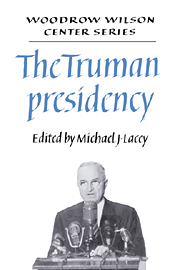Book contents
- Frontmatter
- Contents
- Acknowledgments
- Introduction and summary: The Truman era in retrospect
- 1 The mind and character of Harry S. Truman
- Part I Domestic politics and issues
- 2 Forging America's postwar order: domestic politics and political economy in the age of Truman
- 3 Attitudes toward industry in the Truman administration: the macroeconomic origins of microeconomic policy
- 4 Labor in the Truman era: origins of the “private welfare state”
- 5 Postwar American society: dissent and social reform
- 6 “Some sort of peace”: President Truman, the American people, and the atomic bomb
- Part II Foreign policy and national defense
- About the authors
- Index
5 - Postwar American society: dissent and social reform
Published online by Cambridge University Press: 06 October 2009
- Frontmatter
- Contents
- Acknowledgments
- Introduction and summary: The Truman era in retrospect
- 1 The mind and character of Harry S. Truman
- Part I Domestic politics and issues
- 2 Forging America's postwar order: domestic politics and political economy in the age of Truman
- 3 Attitudes toward industry in the Truman administration: the macroeconomic origins of microeconomic policy
- 4 Labor in the Truman era: origins of the “private welfare state”
- 5 Postwar American society: dissent and social reform
- 6 “Some sort of peace”: President Truman, the American people, and the atomic bomb
- Part II Foreign policy and national defense
- About the authors
- Index
Summary
When Harry Truman became president, one of the first questions asked about him was whether he would carry on, with enthusiasm, the liberal agenda of social reform associated with Franklin Roosevelt's New Deal. Although the process of idealizing the Roosevelt record already may have been reflected in the question, there were many Americans on the left side of the political spectrum who pointed to the Tennessee Valley Authority, the Works Progress Administration, the Farm Security Administration, and the National Youth Administration (among others) as evidence of a commitment by FDR to greater social and economic equality in America. The war had also raised hopes for such equality, especially among black Americans, women workers, and organized labor. Although FDR said he was replacing Dr. New Deal with Dr. Win-the-War during the actual fighting, he had campaigned for reelection in 1944 on a platform calling for a new economic bill of rights at home, a message that sounded to many like a rallying cry to carry forward the New Deal. What would happen to these hopes now that Roosevelt was dead and the Man from Missouri had assumed the reins of power?
Truman, of course, understood the political problem of holding the allegiance of Roosevelt's liberal followers. Within a few months of taking office he announced a legislative program fully consistent with Rooseveltian activism—national health insurance, full employment, higher minimum wages, and more.
- Type
- Chapter
- Information
- The Truman Presidency , pp. 156 - 173Publisher: Cambridge University PressPrint publication year: 1989
- 1
- Cited by



